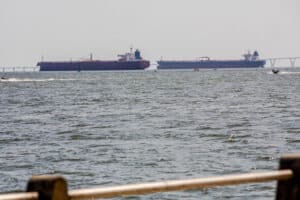About half of South Africa’s R230bn agricultural production is destined for external markets – with a minute amount (less than 2%) going to Russia.

As the geopolitical risks brought on by South Africa’s close ties with Russia stack up, nurturing trade relations with the EU and other key agricultural export markets is critical – or the country risks running at a loss, according to Wandile Sihlobo, chief economist of the Agricultural Business Chamber of South Africa.
Asked about the merits of South Africa’s controversial cosy relationship with Russia to the country’s agricultural sector, Sihlobo said its agricultural trade with Russia is minute.
“We are a sector that is export-oriented, if you grow production without really putting a lot of emphasis on maintaining the export markets then this is going to be a losing [battle],” added Sihlobo.
About half of South Africa’s $13 billion (about R230 billion) agricultural production (according to market size) is destined for external markets, with Asia and the European Union (EU) accounting for the biggest chunks after the African continent.
ALSO READ: US ‘getting over-excited’ over accusation that SA supplied arms to Russia
Perspective
“When you think about our export composition today, and … where are we sending [our] products, 40% of it goes to the African continent,” Sihlobo said.
Roughly 27% is exported to Asia, 20% to the EU, 4% to the UK, and around 4% to the US.
“Russia is nowhere – it’s less than 2% of our agricultural exports that go there,” he said, adding that the US market is much more important to South Africa.
“But the EU is one of the important markets that we want to nurture the relationship with.”
ALSO READ: Ramaphosa in Russia: South Africa is not a Moscow lackey
Russian risk
The South African government has drawn harsh criticism from countries that vehemently oppose President Vladimir Putin, who has been waging a war in Ukraine for more than a year.
Its actions have also been decried by industry leaders, who warn that its closeness to Russia threatens South Africa’s membership of the African Growth and Opportunity Act (Agoa) trade programme, which allows South Africa duty-free access to the US for some produce.
The South African Reserve Bank (Sarb) also issued a warning about South Africa’s stance on the Russian invasion, sounding an alarm on the risk of sanctions.
Financing at risk too
Last week, congressional representatives in the US wrote to President Joe Biden’s administration calling for punitive measures to be imposed on South Africa for its relationship with Russia.
This is an indication that the country’s agricultural sector is headed for “troubled waters”, Agri SA CEO Christo van der Rheede told Moneyweb.
He said the risks are not only associated with the US potentially kicking South Africa out of Agoa, but access to financing from international lenders who are heavily funded by the US is threatened.
“We must tread very, very carefully – and if we are not aligned, we are neutral, [and] then we must be neutral. We cannot at one moment be in bed with the Russians, and the next … we are not aligned,” Van der Rheede said.
He echoes Sihlobo’s sentiments, saying South Africa’s biggest trade partners in the EU are critical.
Sihlobo was speaking at a Think Big Series talk hosted by PSG, and along with the impacts of South Africa’s ties with Russia, spoke about the Agriculture and Agro-processing Master Plan (Aamp), which was launched last year as part of government’s plan to grow investment in the sector and create jobs.
ALSO READ: Russian President Vladimir Putin insist on coming to SA – report
He said key to expanding production and enhancing trade outputs is the unlocking of as much as four million hectares of underutilised land.
“We think the South African government currently has close to four million hectares of land. Some of it is agricultural and can be brought into full production and nearly two million hectares of that land has already been audited by the Agricultural Research Council,” said Sihlobo.
“To put it into perspective, South Africa currently plants about 4.3 million hectares of summer grains and seeds. That number can be increased substantially for grains, horticulture, and livestock, leading to better output for exports and job creation in the process.”
Listen to Jeremy Maggs speaking to Sihlobo in a broad ranging interview on South Africa’s agriculture sector this FixSA podcast (or read the transcript):
This article originally appeared on Moneyweb and was republished with permission.
Read the original article here.






